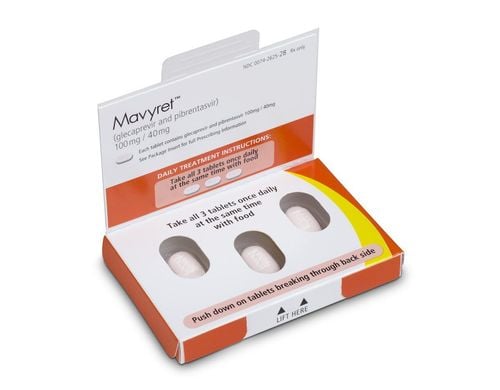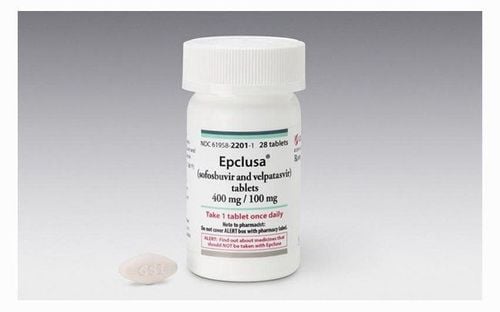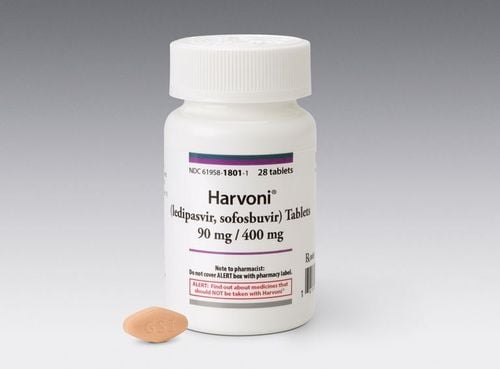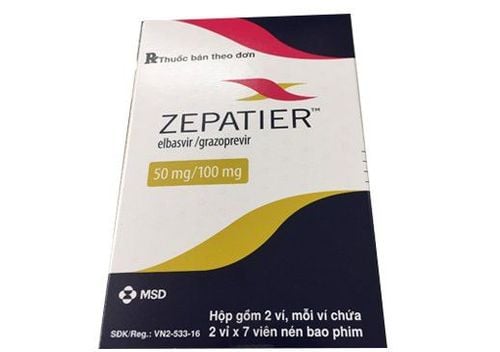This is an automatically translated article.
Hepasig medicine is made in the form of film-coated tablets with the main ingredient being Ribavirin. Hepasig is used in the treatment of certain liver diseases.
1. What is Hepasig?
Hepasig 400 and Hepasig 500 drugs have the main active ingredient is Ribavirin with the strength of 400mg and 500mg, respectively, and excipients just enough for one tablet. Ribavirin is a synthetic nucleoside structurally similar to guanosin. The mechanism of action of ribavirin is not fully known. The drug has antiviral effects by interfering with RNA and DNA synthesis, and ultimately by inhibiting protein synthesis and viral replication. The antiviral effect of Hepasig is mainly in susceptible virus-infected cells.
Ribavirin is active against at least 20 different DNA and RNA viruses. Evidence has shown that the drug has a broad spectrum of activity, against both RNA and DNA viruses. Clinical evaluation has also demonstrated the effectiveness of Hepasig when used by different routes and different formulations (oral, nebulised, topical, intravenous) against measles, varicella, and hepatitis. virus A, hepatitis B, hepatitis C, Herpes simplex types I and II, Herpes zoster, influenza A and B, respiratory syncytial virus (RSV) and many viruses that cause dengue fever.
Indications: Hepasig in combination with peginterferon alpha-2a or interferon alpha-2a for the treatment of chronic hepatitis C in patients with compensated cirrhosis who have not received interferon or who have relapsed after interferon therapy. alpha-2a. Note, Ribavirin is not indicated for use alone.
Contraindications : Do not use Hepasig 400 and Hepasig 500 in the following cases:
People with hypersensitivity to any ingredient of Hepasig; Pregnant or lactating women; Patients with ischemic heart disease, a history of previous severe heart disease including uncontrolled or unstable heart disease in the past 6 months; People with anemia, hemoglobin diseases (eg, sickle cell disease, Mediterranean anemia); People with severe clinical conditions, including diseases of chronic renal failure or with creatinine clearance <50ml/min or people on dialysis; People with hepatitis with decompensated cirrhosis, severe liver failure; People with a history of mental disorders or severe mental disorders, especially major depression, suicidal thoughts; People with autoimmune hepatitis or a history of autoimmune diseases.
2. How to use and dose of Hepasig
How to use: Use Hepasig orally, without regard to meals, do not break or crush the tablet.
Dosage:
Hepatitis C: (in combination regimen with interferon alpha-2a or peginterferon alpha-2a):
Patients < 55kg: 400mg x 2 times/day; Patients 55kg - 75kg: Take a dose of 500mg x 2 times/day; Patients > 75kg: Use 400mg x 3 times/day; Duration of treatment: For patients who relapse after being treated with interferon alpha-2a: 24 weeks (equivalent to 6 months); Efficacy and safety of this combination have not been established when treatment duration is longer than 6 months; Patients who have not been treated with interferon alpha-2a: 24 - 48 weeks (equivalent to 6 - 12 months); By week 24, check for response to treatment by measuring serum HCV RNA levels. If no response, discontinue Hepasig because further treatment is more likely to be ineffective; HCV and HIV co-infection: 400mg x 2 times/day for 24 - 48 weeks (equivalent to 6 - 12 months);
Hepatitis C in children under 18 years old (in combination regimens with interferon alpha-2a or peginterferon alpha-2a):
Patients 47kg - 49kg: Take a dose of 200mg (in the morning) and 400mg (in the afternoon) ; Patients 50kg - 65kg: Use dose 400mg x 2 times/day (in the morning and afternoon); Patients > 65kg: Use as adult dose. Overdose: No cases of ribavirin overdose in clinical trials have been reported. In case of overdose and abnormal symptoms, the patient should immediately report to the doctor and immediately hospitalized for early and timely treatment.
Missed dose: In case you miss a dose while using Hepasig, please take the medicine as soon as possible (usually it can be taken 1-2 hours before the time ordered by the doctor). . However, if it is almost time for your next dose, skip the missed dose of Hepasig and take your next dose at the scheduled time. Be careful not to double the prescribed dose.
3. Side effects of the drug Hepasig
Some unwanted effects when using Hepasig are:
Common: Headache, tremor, fever, fatigue, flu-like symptoms, weight loss, muscle weakness; Decrease in hemoglobin, neutropenia, anemia, thrombocytopenia, swollen lymph nodes; Nausea, loss of appetite, abdominal pain, diarrhea, constipation, dry mouth, abdominal distention, mouth ulcers, bleeding gums, pancreatitis; Increased or decreased blood pressure, increased heart rate; Arthralgia, myalgia, rhabdomyolysis; Psychosis, hot flashes, hyperesthesia, confusion, dizziness; depression, excitability, anxiety, insomnia, emotional ease, decreased concentration; Hair loss, dry skin, itching, rash, rash, sore throat, inflammation of the nose, sinuses, increased sweating, cough, chest pain; Taste and vision disturbances, hearing loss, tinnitus, menstrual disorders, hyperthyroidism, hypothyroidism, decreased libido, fungal infections, absent-mindedness and other viral infections; Uncommon : Suicide attempt; Rare: Bronchospasm, hemolytic anemia, conjunctivitis, interstitial pneumonia. If you experience side effects of Hepasig, patients should promptly notify their doctor to receive advice on the appropriate response.
4. Be careful when using Hepasig
Some notes for patients to remember before and while using Hepasig:
Be careful when using Hepasig for people under 18 years old, especially when combined with interferon alpha-2a because the effects and safety are unknown. safety of the drug in this age group; Before using Hepasig, it is necessary to monitor the risk of possible anemia, conduct blood tests (white blood cell count, platelet count, blood clotting time), repeat at the 2nd week of treatment and 4th, then periodically checked according to the clinical condition; Women of childbearing age: Be sure not to be pregnant or not to become pregnant during treatment and for many months after treatment because Hepasig has a teratogenic risk; Use caution when using Hepasig in people with severe liver damage or decompensated cirrhosis; Oral ribavirin should be used with caution in people with a history of psychosis, especially in those with depression. When combining drugs with interferon-2a, it should be noted that depression is detected in patients; Use caution when using the drug in patients who are likely to have gout; Developing children should be closely monitored for thyroid function every 3 months while taking the drug; Patients infected with hepatitis C virus and HIV should be carefully monitored for signs of lactic acidosis and mitochondrial toxicity while taking Hepasig; Dental and periodontal disorders can occur with the use of Hepasig, it is recommended that patients should have regular dental check-ups and practice good oral hygiene; Ribavirin is fetotoxic, potentially teratogenic. Hepasig should not be used by pregnant women. Before giving the drug to a woman, it must be tested to make sure that she is not pregnant; Women of childbearing age should use effective contraception during treatment and for 6 months after stopping Hepasig. During this time, the patient must have regular monthly checkups to detect pregnancy or not. If pregnant during treatment or within 6 months of using Hepasig, the patient must be informed of the risk of teratogenicity of the drug; Husbands treated with ribavirin should also use contraception during treatment and for 6-7 months after stopping Hepasig; It is not known whether Hepasig is excreted in human milk. Therefore, in order to avoid the adverse effects of the drug on the nursing infant, do not use it for women who are breastfeeding. If you are breastfeeding, you must stop breastfeeding before using Hepabig; Ribavirin has no or negligible influence on the ability to drive and use machines. It should be noted, however, that peginterferon alpha-2a or interferon alpha-2a used in combination with ribavirin may have an effect on the ability to drive and use machines.
5. Hepasig drug interactions
Some of the Hepasig drug interactions are:
Ribavirin inhibits the phosphorylation of stavudine and of zidovudine, this mutual inhibition can also lead to an increase in the amount of HIV in the blood. Care should be taken to monitor HIV RNA levels in the patient's blood. Ribavirin can also increase the phosphorylation of nucleoside derivatives (abacavir, didanosine), increasing the risk of lactic acidosis caused by these drugs; Ribavirin when combined with amphotericin increases blood toxicity, increased side effects; Ribavirin, when combined with didanosine, increases the concentration of didanosine in cells, increasing toxicity to mitochondria. Therefore, the combination of these two drugs should not be used; Ribavirin combined with ganciclovir, flucytosin, pentamidine, hydroxyurea, pyrimethanil or trimetrexate, sulfadiazine will increase blood toxicity, increase drug side effects; Ribavirin when combined with zidovudine: Ribavirin inhibits the phosphorylation of zidovudine to the active form, causing increased side effects. Therefore, do not use the combination of these two drugs; Taking ribavirin along with certain acid-neutralizing drugs that contain magnesium and aluminum will reduce the area under the curve for ribavirin. In the process of using Hepasig 400 and 500 drugs, patients should pay attention to carefully listen to the instructions of the specialist doctor and apply the standard to be able to achieve high efficiency and limit side effects.
Please dial HOTLINE for more information or register for an appointment HERE. Download MyVinmec app to make appointments faster and to manage your bookings easily.













